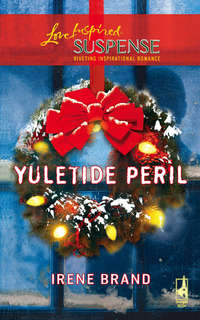
Полная версия
Love at Last
Had she and Perry been given a second chance?
There was no use trying to follow her usual routine as if nothing had happened. As if the foundation of the secure life she’d spent years building hadn’t trembled yesterday when Perry had suddenly reentered her life. It had taken years for her to get over Perry. Not that she’d ever forgotten him and the love they’d shared, but she had reached the place when she didn’t think about him first thing when she opened her eyes in the morning. Sometimes several days could pass and she didn’t wonder where he was, and dreams about him had become less and less frequent.
What would their lives be like today if she hadn’t left Perry, or if she’d gone back to him and they’d married? Considering the wonderful man Perry had become, she believed he would have been a fine husband. If they’d gotten married, they could have had children now—children who would be starting college.
Lorene jumped when the phone rang. She leaned over and picked up the phone from the nightstand. Probably her parents checking on her, she thought, but it was Perry.
“Am I calling too early?” he asked.
“I’ve been up a long time. Remember, I’m a working woman—no sleeping in for me.”
“Mr. Kincaid has scheduled the meeting for seven o’clock in the commission’s office at the bank.”
“How many people are on the commission?”
“A dozen or so—usually only five or six show up for the meetings.”
“It’s way too late for me to take on this promotion deal. We should have been working with the commission for at least a year.”
Perry’s laugh was deep and warm. Lorene envisioned his eyes crinkling from mirth and his lips curving with humor. She groaned inwardly, remembering the laughter they’d once shared together.
“Remember you’re in small-town America now. Somebody comes up with a new idea every time we meet, and it was only two months ago that Mr. Kincaid decided to obtain professional promotion to put Woodston on the map. You can expect new ideas right up to the day of the celebration.”
She feigned a groan. “I’ll do the best I can, but I hope no one expects miracles.”
“What are your plans for today? I have some free time this afternoon if you want me to show you around town.”
Lorene hesitated. If she spent a lot of time with Perry, it would be more difficult for her when she left Woodston. She well remembered when she couldn’t get enough of his company and wanted to be with him all the time, but wasn’t she mature enough now to control her emotions? After all, she thought, I’m middle-aged! I certainly won’t be carried away like I was before.
“I’ll study the file Alma gave me this morning and check out the town after lunch. It would be a big help if you came along.”
Perry had noticed her hesitation and understood her reluctance, for he felt the same way. If he saw her frequently—and how could they avoid it when they’d be associated so closely?—they might be tempted to revisit painful emotional paths. But in the long hours of the night, when he’d reviewed the past and contemplated the future, he’d made up his mind that he couldn’t ask anything from Lorene except friendship.
“I’ll pick you up around two o’clock.”
Lorene laid the phone aside wondering how she could concentrate on her work responsibilities if she saw Perry every day. But she hadn’t become successful in the business world without exerting personal discipline, so she picked up the file folder and forced herself to read and study every plan the commission had in mind for Heritage Week—the culmination of Woodston’s celebration the last week in September.
Lorene had learned quite a lot about Woodston from her reading, but as Perry drove through the business district, he gave a running commentary of the town’s history.
“Woodston was founded two hundred years ago this month when western Kentucky was still a frontier. At first there wasn’t anything except a fort and a few outlying farmsteads, but after steamboats revolutionized river transportation, the town became an important shipping center. The Native Americans, the Shawnees, in particular, moved westward and Woodston started to grow. After the Civil War, the economy plummeted for years, but during World War II the town took on new life.”
Lorene held a small tape recorder in her palm and she pushed the off button. “You like it here, don’t you?”
“Very much. My childhood was spent in small towns—we moved several times as a boy. Father was a preacher in Iowa, so big-city life isn’t for me. I love working with the young people at college.” He didn’t add that association with the students eased his pain over the children he’d never had.
He drove out of town to Frontier Park, where a replica of a log fort was under construction. “The park is located on the site of the original fort,” he explained. “During Heritage Week several people will come down the river on flatboats for the opening ceremonies to reenact life in the early 1800s. They’ll live in the fort, wear period clothing and cook as the settlers did. Artisans will give daily demonstrations on making pioneer crafts.”
“Sounds like fun.”
“We want you to make all of this attractive to out-of-state groups, as well as snag the attention of schoolchildren in Kentucky and the adjoining states.”
“I’ll make phone and computer contacts tomorrow and persuade some of our bus-company clients to arrange tours,” Lorene answered, excitement stirring as it always did when she started a new project.
“The park covers thirty acres,” Perry said. He pointed to a shaft on a high point above the river. “Except for that monument, very little has been done to develop the area. The fort will be permanent, available as a tourist attraction after the celebration is over.”
“Is that path along the river suitable for running? I like to jog every day if possible, and I haven’t seen any other likely place.”
Perry’s eyes lit up. “You’re a runner? So am I.”
“I noticed you’re in good shape,” Lorene said, willing her eyes not to sweep hungrily over his muscular physique.
“I spend a lot of time in the office, and if I’m not careful, I put on too much weight. I don’t have opportunity for any other exercise, but I make time for running.”
“Then it’s safe for me to come out here alone.”
“Yes. Many people use the park. But I run here several times a week. You can come when I do.”
She lowered her eyes. “Don’t tempt me, Perry.”
“Why should it be a temptation?” He tilted her chin slightly, but hurriedly removed his hand as if the physical contact disturbed him. “We can’t ignore what happened between us. Why can’t we put it behind us and be friends? I’m happy you’ve entered my life again, and I want to see as much of you as possible.”
“That could be risky.”
“I’m determined that nothing will happen to cause any problem. And I know you feel the same way.”
He sounded so cheerful about their casual acquaintance that Lorene couldn’t help asking in a husky whisper, “Is it all over for you, Perry? Don’t you feel anything at all?”
He placed his hands on her shoulders in a tender caress and his voice echoed her own longings. “I’d thought, after reaching the mellow years, that my youthful yearnings were gone.” His hands tightened possessively. “But yesterday I learned I’d only fooled myself. You’re as winsome and desirable as you were when you were nineteen. I made a promise to you once and I’ve never broken it. During the past twenty-four hours, other things I thought I’d forgotten have deleted all my preconceived ideas about what the future holds.”
“I haven’t forgotten, either,” she murmured.
Perry’s eyes darkened and Lorene thought he was going to kiss her, but he released her and stepped back quickly.
“We’ll have to forget what happened when we were in college and make the right choices this time. Since neither of us is married, there’s no reason we can’t be friends like we used to be.”
The flame in her heart ignited by Perry’s love had burned steadily for years, but his words almost extinguished it. She could never be satisfied with friendship. Maybe this meeting had been God-ordained. Perhaps God was trying to tell them it was time to stop pining for the past. If so, after her work was finished in Woodston, she’d go back to Pittsburgh, knowing at last that the break between them was final.
“Let’s look over the fort and walk around my favorite running trail,” Perry said. “It winds along the river for a mile and then curves through the trees back to the starting point. I’m going with some students to a seminar in Lexington tomorrow, but we can plan to run together on Monday morning.”
She nodded, unable to talk. Perry had shifted gears from the past to the present too rapidly for her. But she obediently followed him into the fort, where workmen were putting the finishing touches on the blockhouse.
“I’ll bring my camera tomorrow and get a few scenes to send out right away. My office staff will take care of distributing short clips to air on national programs. I’m getting excited about the celebration, and I’ve decided I want to stay for this project. I’m glad I didn’t let my temper cause me to leave.”
His eyes caressed her with a tender smile. “That makes two of us.”
Lorene admitted Mr. Kincaid knew how to conduct a business meeting. At the outset, Perry stated that he and Lorene had been friends in college and were pleased to meet again after so many years. His explanation paved the way for them to be on a first-name basis. Perry introduced her to the other commission members and Lorene took particular note of two of them.
Zeb Denney, husband of Perry’s secretary, was Woodston’s chief of police. He was a quiet, broad-shouldered, short man.
The local historian, Reginald Peters, was in his eighties. A mop of gray hair hung untidily around his face, but his dark brown eyes were intelligent and alert. His ancestor had been one of Woodston’s founding fathers, and while it was plain that Kincaid was in charge of the celebration, Peters’s opinions also carried a lot of weight in the decision making.
Heritage Week would begin with a parade on the fourth Saturday in September. In addition to the reenactment at the fort, a steamboat replica, River Queen, would be on hand during the week to take people for rides up and down the Ohio, featuring a dinner cruise each evening. A carnival would be in town. Craft shows had been scheduled.
“Miss Harvey,” Kincaid asked before the meeting adjourned, “do you have any questions?”
“As I understand, my job is to spread the news of the celebration nationwide. We can provide clips for all major television networks and numerous radio stations. But as far as I can determine, no financial arrangements have been made, leading me to the most important question—how much do you expect to spend for this publicity? Television advertising is expensive.”
All eyes turned toward Kincaid. He cleared his throat a time or two and riffled the pages on his desk. “Perhaps you’d better come up with a proposal of what you recommend and how much it will cost.”
“Our representative should have done that and gotten your approval before we even moved on-site, but Mr. Cranston didn’t do what he was supposed to do, so our agency, as well as Woodston, is suffering for it.”
“Can you estimate a price?” Kincaid asked cautiously.
Believing it was a trifle late for caution, Lorene said, “Not right now. But I’ll work this weekend and have an estimate for you on Monday. If you can’t afford us, I’ll move out and there will be no charge to Woodston. To be honest, a smaller company would probably do as much for you as I will.”
Perry’s heart plummeted. If the commission rejected the proposal, Lorene might leave in a few days.
He made it a point to ride down in the elevator with Lorene, and walked with her to the parking lot behind the bank. Zeb Denney and Reginald Peters sauntered along behind them, but when Perry opened the station wagon’s door for Lorene, he said quietly, “If Woodston can’t afford your services and you go away next week, will you leave your telephone number and address?”
Her lips curved into a soft smile. “You already have my telephone number. Circumstances are a lot different now than they were when I knew you before. When I leave Woodston, if it seems best for us to separate permanently, I’ll tell you so. I’ve stopped running.” She paused, and a pensive expression dimmed her eyes. “Or at least, I think I have.”
The board members got into their cars and drove away. Perry’s lips moved over hers, gently at first, then more insistent. After a few blissful moments she pushed on his chest to break the caress.
“Don’t, Perry,” she murmured. “I can’t handle this.”
“Sorry. I thought a kiss for old times’ sake wouldn’t hurt anything.”
Her hand was still on his chest, and she moved it to monitor his heartbeat, which was as rapid as hers.
“But you found out differently, didn’t you?” She moved away from him and slid into her vehicle. “These next two months will go much more smoothly, Perry, if we maintain a strict business relationship. But if it turns out that we can’t patch up our differences, I’ll not make a mess of things like I did before. I won’t disappear.”
As she drove away, Perry wondered how he’d feel if he knew she was leaving for the last time. But how could he offer her more than friendship? When he’d been at his lowest ebb, mentally and spiritually, he’d promised God that he would give up everything, including Lorene, for full-time Christian service. After he made that vow, warm peace had flooded his heart, and Perry believed he’d made the right choice. Now, remembering the touch of Lorene’s lips, he wasn’t so sure.
Chapter Four
Lorene spent Saturday morning walking along Woodston’s streets to get a feel for the history of the town. The population was near five thousand, excluding college students, and except for a few small industries, most of the residents had jobs in Louisville and Evansville and commuted to work. Woodston College was the town’s major employer.
Obviously, the glory days of the town had been the steamboat era. Lorene checked out renovated warehouses along Front Street, now housing numerous restaurants where any kind of food from sodas, ice cream, shakes, French fries, burgers and spaghetti to expensive steak cuts and shrimp was served. Small shops offered collectibles, crafts and souvenirs for sale.
The current Woodston business district was located on a high knoll safe from all except the most extreme floods. Front Street stores, however, had uneven floors and dark lines on buildings marking high-water stages when the Ohio River had flooded the town many times.
Lorene bought a burger and iced tea from a street vendor and sat on a concrete bench, looking out over the river, to enjoy her lunch. Several pleasure boats floated lazily back and forth, but they moved out of the way for a large towboat that moved upstream. There was something about the laid-back atmosphere of a small town that gave one a sense of security and well-being. Lorene could understand why Perry was satisfied here.
She spent an hour or more walking around the campus of Woodston Christian College, which was the focal point of the business district. The college had been founded before the Civil War, and the original building, Old Main, now housed the administrative staff, where Perry’s office was located. Perry was gone for the day, and the campus seemed empty without him.
Many of the businesses along Main Street, in buildings that dated to the antebellum South, catered to the students. Woodston Banking and Trust, Mr. Kincaid’s bank, was located in a three-story modern brick building, and Lorene went in to open a checking account for personal use during the time she was in Woodston.
In midafternoon she returned to Riverview Ridge, where Dottie and John were working in the yard. Dottie waved her hand, and Lorene walked to the flower bed where Dottie was pulling weeds.
“We’re trying to get the place in shape before Heritage Week,” she said. “I’m booked up that week, so I’ll be busy.”
“I’m surprised I was able to get accommodations then,” Lorene said.
“I’d just had a cancellation about an hour before you drove in,” she said, “or I couldn’t have taken you. Want to eat dinner with us this evening?”
“Yes, if it’s not too late to make reservations. I’ve been looking over Woodston today for some ideas on planning the publicity. It’s an interesting town.”
“We think so, but we’ve only been here a few years. After John retired, we wanted a quieter place than Louisville, but still on the river. We heard that this property was for sale and decided it would be a good investment—a place for us to have a little income and give us a reason for getting out of bed in the morning.”
“What time is dinner?”
“Six-thirty.”
“I’ll see you then. I’ve been grocery shopping, so I’d better put my cold things in the fridge, unpack the rest of my belongings and settle in for the long haul.”
A carved mantel of oak, embellished with designs of oak leaves and pineapples, was centered in one wall of Riverview Ridge’s dining room, with two original cupboards on each side. The cupboards were filled with antique dishes. A floral-patterned paper covered the walls above the wooden chair rail. The wide panels of the oak floor were highly polished, but numerous scars indicated the rough wear the wood had seen for over a century.
Several small tables were placed around the large room, providing seating capacity for twenty. Lorene joined a middle-aged couple from Illinois, who were traveling through Kentucky on a nostalgia journey retracing the places they’d visited during their honeymoon twenty-five years earlier. They showed Lorene pictures of their children and grandchildren. The meal was served family-style with a choice of country-fried chicken or baked fish, a variety of vegetables and salads and, for dessert, a fruit plate or rhubarb-raisin pie. The cuisine was evidently an attractive feature of Riverview Ridge.
Lorene and her companions spent over an hour at the table, and it was an enjoyable interlude, but when she excused herself and went to the apartment, Lorene stood for a long time staring out the window. Her eyes didn’t focus on the pastoral setting, for she was in a wistful mood. While she’d been exerting all of her time and energy in building a successful business, Lorene hadn’t often allowed herself to dwell on the things she was missing in life. Indeed, considering the unhappy marriages of her parents and her younger sister, Rose, she’d long ago concluded that she’d made the right decision to remain single. If marriage didn’t offer any more love, understanding and companionship than her family’s marriages demonstrated, she wasn’t interested.
But visiting with the contented couple this evening had opened her eyes to the happiness and contentment possible in a marriage. The couple’s life hadn’t been without difficulties, but through sickness, disappointment and death, their love had expanded until it was warmer and stronger than it had been on their wedding day. The tender glances exchanged by husband and wife as they remembered their honeymoon had been Lorene’s undoing. She was convinced that she and Perry could have had a similar marriage. Why hadn’t she been strong enough to defy her parents and go back to Perry before it was too late?
Lorene leaned her head against the windowpane, but she didn’t cry. Her anguish was too deep for tears. If the decision had been hers, after she’d gotten over her anger at Perry’s rejection she would have found him again. But once she returned home and her parents learned about her affair with Perry, they took matters out of her hands. Her father had been transferred to another state, and she’d gone with her parents to enter another university. If she had it to do over, Lorene believed she would have defied them, but she hadn’t been very assertive then, so she’d let Perry drift out of her life.
For months after their separation, Lorene had been angry at God for causing the rift between her and Perry, but when she got away from her parents she started going to church again. But one day she’d heard a sermon on the unpardonable sin that had puzzled and agitated her. She’d wondered since that time if she’d committed sins that couldn’t be forgiven, but she was hesitant to bare her personal life to anyone. Who would have thought that an unexpected pregnancy could have caused so much heartache?
In spite of her doubts that God would forgive her, Lorene had continued to pray, and she believed God heard her at times, but other days there seemed to be a large gulf between her and Heaven that mere words couldn’t bridge. Her spirits plummeted during those periods, and she feared her past would always stand in the way of complete communion with God. Perry knew most of her shortcomings. Perhaps she could talk with him about her spiritual doubts and questions. But on second thought, she decided Perry was the last person she should confide in.
Lorene was jolted out of her melancholy when Dottie called up the back stairs. “You’re wanted on the phone.”
Perry had her mobile phone number, so he wouldn’t have called Riverview Ridge.
Lorene went to the head of the stairs. “Do you know who it is?”
“Alma Denney.”
Lorene didn’t hand out her cell phone number recklessly, but it would be all right for Perry’s secretary to have it. And Dottie, too, should know if someone else tried to reach her through the B and B. “Please give her my cell phone number and ask her to call me up here? Got a pencil to write it down?”
“Nope, but I’ve got a good memory.”
Grinning, Lorene called off the telephone digits.
The interruption was welcome to Lorene. If she’d spent many more minutes thinking about what she’d missed with Perry, she would soon have indulged in a pity party, with herself as the only guest.
“Hello, Alma,” Lorene said when her phone rang soon afterward. “What can I do for you?”
In the soft drawl that Lorene was beginning to recognize as the native dialect, Alma answered, “I called to invite you to church at the college chapel tomorrow morning. There won’t be a large crowd, because many of the students go home on weekends, but our chaplain always has a good message. And we want you to have lunch at our house afterward. Perry usually has the noon meal with us on Sunday.”
The invitation surprised Lorene, for she’d thought Alma resented her unexplained connection with Perry, and she hesitated. Was the woman seeking an opportunity to pry into her past? She had intended to go to church tomorrow, knowing that she could get some good ideas for publicity as she watched Woodston residents worship. And she wanted to see Perry as much as she could while she was in Woodston. She must store up some new memories to cherish when she went back to Pittsburgh. The town had seemed empty today because he hadn’t been here.
“Thank you. I’ll be happy to come, although I can’t stay late. I have to hand Mr. Kincaid a financial proposal Monday morning, and it isn’t ready yet.”
“Feel free to leave when you must,” Alma assured her.
Alma waited for Lorene at the chapel door on Sunday morning, and they entered the small sanctuary to the sound of organ music. Zeb, Alma’s husband, nodded a welcome to Lorene as she and Alma slid into a pew brightened by light through a stained-glass memorial window.
Lorene focused her thoughts on the minister’s message, “The Unconditional Love of God,” based on the Scripture passage from Jeremiah 31. “I have loved you with an everlasting love; I have drawn you with loving kindness.”
“God’s love is not fickle like the devotion of humans,” the minister stressed at the outset of his sermon, “which is often motivated by the actions of those we love.
“His love is unconditional. He loves us if we’re good. He loves us if we’re bad. God doesn’t treat His children as some earthly father might, saying to His child, ‘If you’ll be good, I’ll love you.’ There is absolutely nothing we can do that can make God love us more or less than He does right now. Even when our actions grieve the heart of God, His love remains steadfast.”








